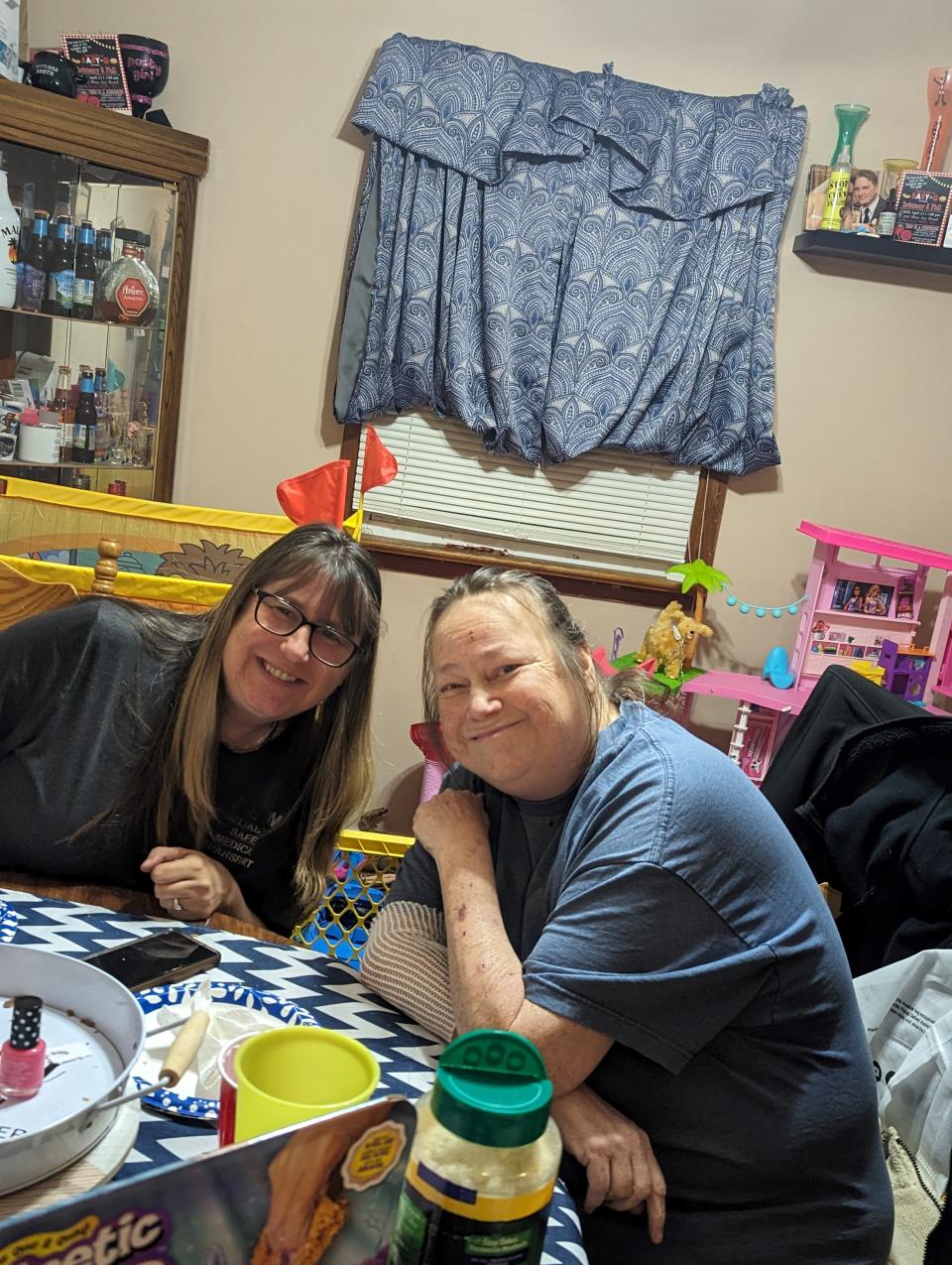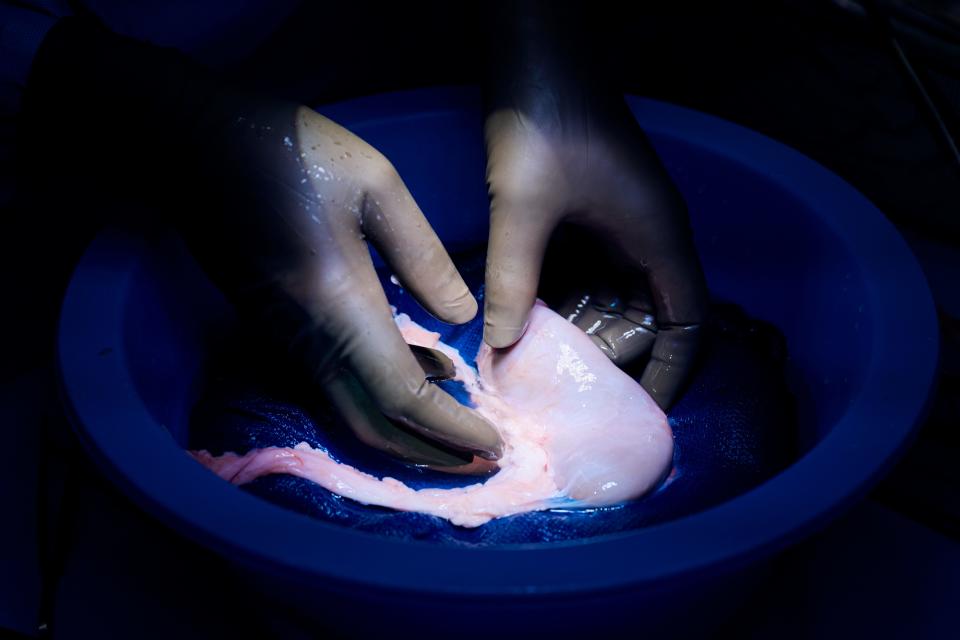Grandmother gets new lease on life from heart pump, pig kidney
A 54-year-old New Jersey grandmother was "days or weeks" from death earlier this month when she became the fourth person ever to receive an organ from a pig.
Lisa Pisano was suffering from heart failure, needed regular dialysis and had just fallen and broken her foot when she arrived at NYU Langone Health. She'd been increasingly sick for years, suffering multiple heart attacks and a bypass surgery.
She needed both a new heart pump and a new kidney, but because she was on dialysis, she wasn't a good candidate for the heart pump, and because of her heart problems she wouldn't have qualified for a kidney transplant, said Dr. Robert Montgomery, chair of the department of surgery and director of the NYU Langone Transplant Institute. "She was in a Catch-22," he said.
Pisano was given two choices: She could accept her fate and say goodbye to her beloved grandchildren or take a chance on an artificial heart pump plus a kidney from a gene-edited pig. She opted for the chance.

On April 4, surgeons implanted the heart pump, a device called a left ventricular assist device or LVAD. She was placed on continuous dialysis and bedrest for eight days before receiving the pig kidney on April 12, in a surgery Montgomery led.
In addition to showing the viability of the pig kidney, the procedure also shows that LVADs can be used successfully in patients on dialysis. Montgomery said.
"Maybe some will get human transplants because now we've shown that an LVAD can support a kidney transplant," he said. "No one really knew that."
Seizing the opportunity
Pisano volunteered for the surgery to help herself and because "if it didn't work for me, it might have worked for somebody else."
Her health had started to go downhill in 2017 after her first heart attack and got progressively worse. She had worked in retail, at Kohl's and Walmart over the years, but had to quit. Her life got smaller and smaller. In recent months, she couldn't even go shopping with her daughter.
When Montgomery explained the double procedure to her, she saw it as her only opportunity to extend her life, so she took it. "That was that," Pisano said.
She said she isn't bothered at all by the idea of having a pig part inside of her.
She doesn't eat bacon anymore because of the salt, but she used to be a fan. Asked if her family members were cracking jokes about it, "they'd better not," she said.
Her recovery is slow, but she's not in a lot of pain, she said. She's been getting daily physical therapy and taking a few steps with a walker.
Her main goal, she said, is to get back to playing with her two grandchildren and cooking for her husband. Just "living a normal life."
Addressing the major roadblocks of transplantation
More than 100,000 Americans wait on organ transplant lists and others would join those lists if they could. But thousands of people die every year waiting for an organ, and others who are lucky enough to receive one suffer from organ rejection or from the immune suppression used to prevent rejection.
Montgomery, who led Pisano's kidney transplant, hopes the pig organs he uses can solve both problems.
There are several competing models for pig organs, one used at NYU and another used at Massachusetts General Hospital, which performed the first live kidney transplant from a pig in March.
The pig used by Massachusetts General, created by a company called eGenesis, was a cloned animal with 69 gene edits. That procedure seems to have gone well, saving the life of Richard "Rick" Slayman, a Massachusetts man who was released from the hospital about two weeks after the procedure. Now, seven weeks after the surgery, Slayman continues his recovery at home.
The NYU pig has only a single gene removed, which would otherwise cause the human body to immediately reject the pig organ. Lacking just one gene, the pig can be bred through normal reproduction, which is cheaper and easier to do at large scale than cloning, Montgomery said.

Along with its kidney, the NYU pig, bred by United Therapeutics, also provided its thymus, an organ of the immune system. Adding the pig's thymus, Montgomery said, should protect the pig kidney from being attacked by the human immune system.
Hopefully, this will eventually allow doctors to reduce the medication all transplant patients have to take to limit the risk of organ rejection. The same medication that saves the organ also can damage it long-term, though, and, by suppressing the immune system, increases the patient's risk for infection and some cancers.
"One of the reasons we've come up with this simpler gene edit and thymus transplant," Montgomery said, "is to address the two biggest problems in transplantation: lack of organs and immunosuppression."
Moving from animal testing to people
But all of this is theoretical until it's tested in people.
Tests have been ongoing in primates for more than five years and in "decedents," or brain-dead people on life support since 2021.
So far, the Food and Drug Administration has allowed pig organs to be tested in four living people. Two received pig hearts at the University of Maryland, in 2022 and 2023, but survived less than two months each.
It's too soon to know whether the two patients who received pig kidneys will fare better, but the heart patients were likely sicker to begin with, Montgomery said.
Researchers had assumed human patients would be easier to keep alive with organs from pigs rather than primates. But Montgomery said the deaths in Maryland showed that they essentially will have to start over in people, trying to understand how best to manage the risk of rejection and other challenges.
"I think we're at the beginning of really understanding what is going to happen in humans," he said. "I don't think it's going to look that much like primates. It's going to be a really different game."
Montgomery said he is going to continue to test pig organs in brain-dead people to try to optimize the process. NYU has already performed five transplants in such donated bodies.
The next step for so-called xenotransplantation will be to launch formal clinical trials in living patients. Montgomery, a heart transplant patient himself, said he hopes small trials with a handful of patients each could start as soon as next year, using both gene editing approaches, to see if one will prove safer or longer-lasting.
"It all seems to be accelerating," he said.
Karen Weintraub can be reached at [email protected].
This article originally appeared on USA TODAY: Pig kidney, heart pump transplant milestone brings grandmother hope
